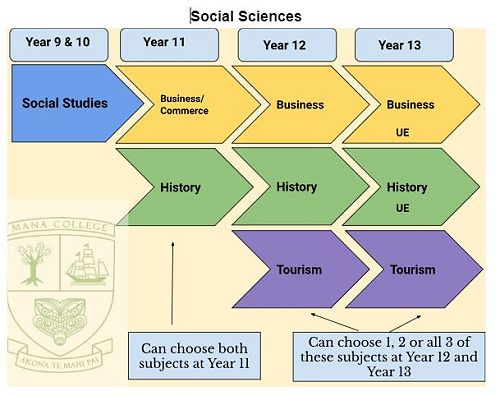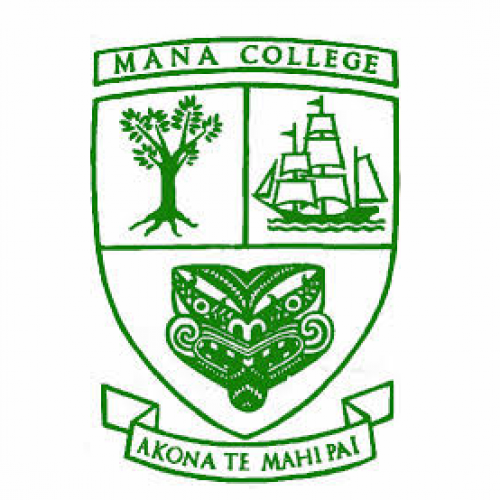
Learning Area: Social Sciences
LEARNING AREA: SOCIAL SCIENCES
COMMERCE/BUSINESS: NCEA LEVEL 1
Course description: Level 1 commerce gives akonga an introduction to Accounting, Economics and Business concepts and models. Akonga will gain knowledge and understanding of both financial and non financial decision making including putake (the origin or reason for being). You will look at different organisations and their decision making processes, as well as develop and run your own business.
Possible pathways: This course will help to develop a strong basis for Level 2 and 3 Business.
NCEA credits available: 15 Achievement Standards credits , two internal and one external.
Exclusions: None
BUSINESS: NCEA LEVEL 2
Course description: This course introduces students to macroeconomics and studies topics around inflation, growth and unemployment. It examines how the New Zealand economy reacts to changes. The course also offers students the opportunity to extend their knowledge in designing a new product and developing a business plan. There is an opportunity for students to gain credits in Technology for their business product.
Possible pathways: This course supports students who want to study Business or Commerce at University. It builds strong foundations for studying Level 3 Business.
NCEA credits available: Students can gain up to 16 internal Achievement Standard credits and 4 external credits for Business.
Exclusions: None
BUSINESS: NCEA LEVEL 3
Course description: This course is about how individuals and groups of people organise, plan, and act to create and develop goods and services to satisfy customers.
Students will form a company, undertake market research, produce a business and marketing plan, present a pitch on their business idea, sell their goods or service and then review their success. Students also analyse how and why New Zealand businesses that operate in global markets make operational and strategic decisions.
Students gain knowledge and understanding of good business practice through fostering qualities of resilience, resourcefulness and initiative. Skills are developed in problem solving, co-operation, decision making, negotiation, and written and oral communication.
Possible pathways: This course supports students who want to study Business or Commerce at University, with majors in accounting, agri-business, human resource management, economics, marketing and many more.
NCEA credits available: Students can gain up to 15 Achievement Standard credits internally and University Entrance.
Exclusions: None
HISTORY NCEA LEVEL 1
Course description: This course introduces students to how historical events have impacted the world. This course will develop critical thinking about history and understanding of different perspectives on historical events. Students will be consulted about topics that they want to cover in history. Half of the year will focus on New Zealand history and the other half will focus on international history.
Possible pathways: Researcher, Working on the Treaty of Waitangi Settlements, Historian, Working for Ministry of Culture and Heritage, Working for Iwi on Historical projects, Archivist, Heritage Manager, Historical Building Inspector, Conservation Officer, Museum Education Officer, Museum Curator, Museum Exhibitions Officer and History Teacher.
NCEA credits available: 15 Achievement Standard credits, two internal standards and one external standard
Exclusions: None
HISTORY: NCEA LEVEL 2
Course description: Students studying year 12 history will gain an understanding about the past and how ideas about the past have changed with time. Students will understand their community, society and nation through history. Students will learn that the truth is subjective and should be supported by firm evidence and argument. Students will be consulted about topics that they want to cover in history. Half of the year will focus on New Zealand history and the other half will focus on international history.
Possible pathways: Researcher, Working on the Treaty of Waitangi Settlements, Historian, Working for Ministry of Culture and Heritage, Working for Iwi on Historical projects, Archivist, Heritage Manager, Historical Building Inspector, Conservation Officer, Museum Education Officer, Museum Curator, Museum Exhibitions Officer and History Teacher.
NCEA credits available: 20 Achievement Standard credits
Exclusions: None
HISTORY: NCEA LEVEL 3
Course description: Students studying year 13 history will develop a deeper understanding of how history has shaped the present. They will learn that historical truths are subjective and should be supported with firm evidence and coherent arguments. Students will be consulted about topics that they want to cover in history. Half of the year will focus on New Zealand history and the other half will focus on international history.
Possible pathways: Researcher, Working on the Treaty of Waitangi Settlements, Historian, Working for Ministry of Culture and Heritage, Working for Iwi on Historical projects, Archivist, Heritage Manager, Historical Building Inspector, Conservation Officer, Museum Education Officer, Museum Curator, Museum Exhibitions Officer and History Teacher.
NCEA credits available: 20 Achievement Standard credits
Exclusions: None
TOURISM: NCEA LEVEL 2 AND 3
Course description: This course enables students to learn about different aspects of the New Zealand and overseas Tourism Industries. It is open to Year 12 and 13 students
Possible pathways: Students can move on to further study at Whitireia or NZ School of Tourism or employment in the Travel and Tourism Industry.
NCEA credits available: Students can gain 15-20 Unit Standard credits internally in this course.
Exclusions: None
Gallery

